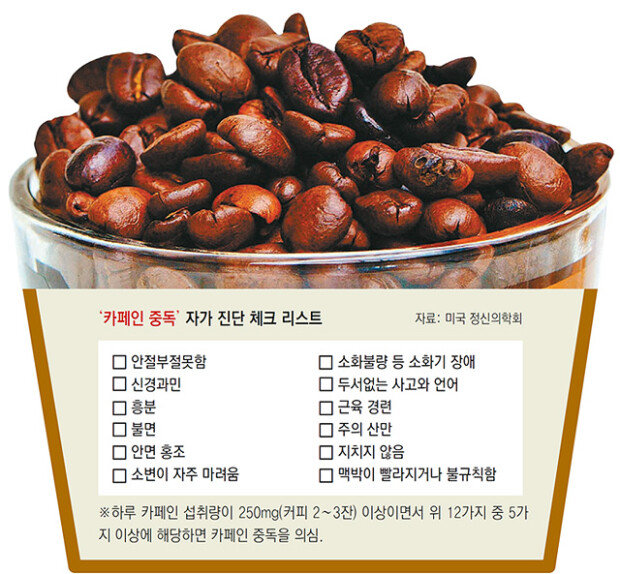Side effects of too much caffeine
Side effects of too much caffeine
Posted January. 16, 2020 07:40,
Updated January. 16, 2020 07:40

A New Year’s resolution for office worker Lee, 29, is to overcome the addiction to coffee. Lee’s habit of drinking three cups of coffee a day, one on his way to workㅡone with his colleagues after the lunch, and the third in the office during sleepy afternoon hoursㅡhas made him feel tired without coffee. “I had a headache when I first stopped drinking coffee but I started to have a good night’s sleep after a week. Now I feel like I’m focused and more productive at work,” Lee said.
Winter is a season, when we crave for a warm cup of coffee that will warm us up. Coffee is not just a choice of preference anymore but has become a culture of communication. A cup of coffee can be a little break in everyday life and helps people at school or at work by providing a temporary jolt of energy. Drinking coffee too much, however, can bring about an addiction to coffee, thereby doing harm to your health.
A daily caffeine intake recommended by the Ministry of Food and Drug Safety is up to 400 milligrams. According to the Korea Consumer Agency in 2018, a cup of Americano (303mL on average) sold at major coffee chains in Korea has an average caffeine concentration of 136 milligrams. It is not difficult to exceed the daily recommended dose of caffeine if you drink a cup of Americano in the morning, after lunch, and in the evening in a day.
Caffeine makes you feel good by stimulating the central nervous system. It also inhibits adenosine receptors, which facilitate sleep, and temporarily improves memory by stimulating the nerves. But over 500 milligrams of caffeine a day can result in a range of symptoms, including anxiety and nervousness as well as an increase in heart rate, pulse rate, and blood pressure. “It can also cause other symptoms, such as digestive disorder, frequent urination, tinnitus, and numbness in legs and arms,” said Kwon Gil-young, professor of family medicine at Nowon Eulji Medical Center.
“Caffeine stays longer in the body of children, who have a slower metabolism than adults, thereby making them vulnerable to headache, anxiety, and hypersensitivity,” said Kwon. “Caffeine itself does not inhibit growth but can obstruct the absorption of calcium or iron in food.”
wizi@donga.com







